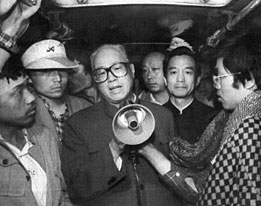« Political Writer's Block | Main | 'Ello Gov'nah! »
January 17, 2005
Zhao Ziyang, 1919—2005

Zhao Ziyang, former Premier of the People's Republic of China and Secretary General of the Chinese Communist Party, passed away on Sunday at the age of 85. In his career and after, Zhao stood for human decency and liberty, and passed the final years of his life in house arrest, after the 1989 Tiananmen protests, for his sympathetic view towards the student protesters.
Zhao was a reformer in the CCP, playing a major role in some of the key reforms that have moved Mainland China out of collectivism into the considerably more prosperous pseudo-capitalist economic system it enjoys today. In the mid-1970s, he carried out household responsibility system reforms in Sichuan province that would eventually massively increase agricultural output throughtout China.
Zhao would later extend his reform visions nationally; as the right-hand man of Deng Xiaoping, he implemented such policies as the Special Economic Zones. But Zhao stood out as a reformer in the political realm as well: he believed in the inevitability and necessity of political democratization.
Zhao's preference for reform, economical as well as political, riled many of the old guard. His suggestion that the party (CCP) and the state structures be separated led to his removal from the PRC premiership, but it would be the death of Hu Yaobang (Zhao's predecessor as CCP Secretary General), and the subsequent student protests at Tiananmen Square, that would end Zhao's political career and stain the hands of the CCP leaders with blood to this day.
The student demonstrators mourned the death of the honest Hu and took the opportunity to demand political reforms and recognition of constitutional human rights. Zhao was sympathetic to the students and urged other senior CCP members to implement some sort of political reform; he was opposed by hard-liners including Li Peng, Zhao's successor as PRC Premier. Eventually, the paramount leaders who controlled the CCP behind the scenes, led by Deng, sided with the hard-liners. Knowing that his political career and the student protests were effectively numbered, Zhao personally went into Tiananmen Square on 19 May 1989, and pled for the students to end their hunger strike:
Dear students, we come too late. Dear students, we are sorry. You are right to discuss and criticize us. I do not come here to ask for your forgiveness. What I want to say is that your bodies are frail: the hunger strike has gone on for seven days, and you cannot continue. As the hunger strike grows longer, your bodies will be irreparably harmed and you put your lives in danger....
Little over two weeks later, the tanks rolled along Changan Boulevard and the People's "Liberation" Army fired upon commoners defending the students in the Square. Zhao, meanwhile, would be placed under house arrest, as the CCP move to diminish his accomplishments and whitewash the events of 4 June 1989.
It is difficult and probably premature to judge the overall record of Zhao: there are his early economic successes in Sichuan, but inflation was a major problem during his tenure as Secretary General, and indeed inflation resentment was a major factor in the 1989 protests. But what can be said without doubt is that his honourable character and integrity surpass those who, in 1989, stopped being the servants of the people and became their monsters instead.
The Daily Telegraph has a detailed biography of Zhao.
Zhao's daughter sent a text message after his death to his family and friends. It read: "He is finally free."
Posted by Kelvin at January 17, 2005 7:14 PM
Trackback Pings
TrackBack URL for this entry:
http://www.kelvin-chan.net/mt/mt-tb.cgi/17
Comments
Post a comment
Thanks for signing in, . Now you can comment. (sign out)
(If you haven't left a comment here before, you may need to be approved by the site owner before your comment will appear. Until then, it won't appear on the entry. Thanks for waiting.)